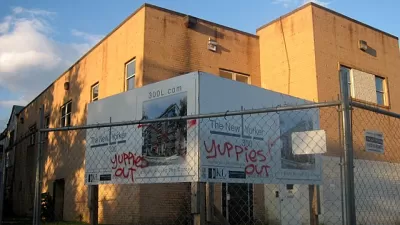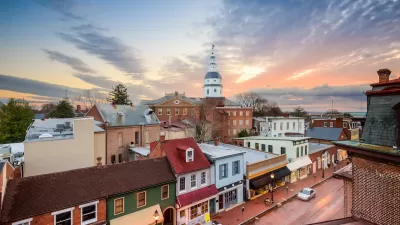Trying to thread the needle between those who celebrate the demise of the exurb and those who bemoan smart growth policies, Edward Glaeser argues that we can, and should, have it all when it comes to housing choice in America.
Rather than picking sides in the sprawl versus density debate, Glaeser argues for the importance of all of the above:
"Economic theory typically embraces choice, whether in supermarkets or in cities. It is a great thing that Americans can opt to live in dense cities or sprawling suburbs. As long as people pay the social costs of their actions, and are not subsidized by policies that artificially favor one living style over another, then it is splendid that we have plenty of options, some with sunshine and inexpensive mass-produced housing and others with high wages and costly apartments."
The crucial caveat in the above statement should not go unnoticed, as it serves as the front line in the debate between the supporters of sprawl and density. Rather than getting caught up in current skirmishes, however, Glaeser frames the debate in larger historical terms:
"The tides of history may occasionally make one form of living appear temporarily triumphant -- as suburbia did, thanks to cheap cars and abundant highways, in the 1960s and 1970s -- but soon enough other forces reassert themselves. After 1980, globalization and new technologies increased the value of ideas and innovation, which in turn led to a rebirth of those older, denser cities that were heavy with human capital."
In the end, Glaeser offers suggestions to ameliorate the worst side effects of each development type:
"Cities such as New York, Boston and San Francisco, where prices have stayed reasonably high, despite the crash, should do more to promote affordable housing, especially by eliminating the barriers to new construction."
"Cities such as Dallas and Houston are doing well with their low-cost pro-business model, but history has been less kind to less-educated places. They should be investing more in education and in urban amenities that will attract the more skilled."
"The biggest challenges are in the places like Merced and Detroit that have too much housing relative to the level of demand. These places have too little education, and lack the industrial strength that holds up Houston. These areas should at least focus on educating their children and creating a more business-friendly environment."
FULL STORY: You Hate Taxes, but You’re Not Moving to Nashville

Alabama: Trump Terminates Settlements for Black Communities Harmed By Raw Sewage
Trump deemed the landmark civil rights agreement “illegal DEI and environmental justice policy.”

Study: Maui’s Plan to Convert Vacation Rentals to Long-Term Housing Could Cause Nearly $1 Billion Economic Loss
The plan would reduce visitor accommodation by 25% resulting in 1,900 jobs lost.

Why Should We Subsidize Public Transportation?
Many public transit agencies face financial stress due to rising costs, declining fare revenue, and declining subsidies. Transit advocates must provide a strong business case for increasing public transit funding.

Paris Bike Boom Leads to Steep Drop in Air Pollution
The French city’s air quality has improved dramatically in the past 20 years, coinciding with a growth in cycling.

Why Housing Costs More to Build in California Than in Texas
Hard costs like labor and materials combined with ‘soft’ costs such as permitting make building in the San Francisco Bay Area almost three times as costly as in Texas cities.

San Diego County Sees a Rise in Urban Coyotes
San Diego County experiences a rise in urban coyotes, as sightings become prevalent throughout its urban neighbourhoods and surrounding areas.
Urban Design for Planners 1: Software Tools
This six-course series explores essential urban design concepts using open source software and equips planners with the tools they need to participate fully in the urban design process.
Planning for Universal Design
Learn the tools for implementing Universal Design in planning regulations.
Smith Gee Studio
Alamo Area Metropolitan Planning Organization
City of Santa Clarita
Institute for Housing and Urban Development Studies (IHS)
City of Grandview
Harvard GSD Executive Education
Toledo-Lucas County Plan Commissions
Salt Lake City
NYU Wagner Graduate School of Public Service





























